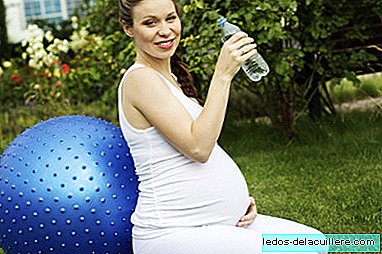
According to the "VIII CinfaSalud Study. Perception and habits of Spanish women during pregnancy", almost 70 percent of pregnant women in our country do not maintain about healthy lifestyle habits during pregnancy.
One in four pregnant women does not take care of their diet, and three in ten do not practice any type of physical exercise. It is important to be aware of these data and take care of yourself correctly during pregnancy, because it will depend not only on our health, but also on our baby.
70 percent do not have adequate habits
The adoption of correct habits during pregnancy is essential, both to maintain the health of the pregnant woman and that of her future baby, as well as to prevent possible complications. However, of the 2,436 mothers participating in the Cinfa survey, almost 70 percent have admitted not following proper habits in regards to their diet, routines and exercise.
Feeding during pregnancy: much to improve
According to the survey, more than 25 percent of pregnant women do not eat according to their status, and some even worsen their diet by eating large amounts or eating according to their cravings, no matter what.
It is also alarming the number of women who during their pregnancy they don't pay attention to hydration, since almost 70 percent are unaware that the liquid needs in the gestation period increase and it is very important that they be met.

On the other hand, although there is a greater awareness regarding conflicting or risky foods during pregnancy, there is still much to improve since more than 40 percent of pregnant women do not avoid eating the next:
Dairy products made with unpasteurized milk, pate, smoked as salmon or sausage, likely to cause listeriosis.
Raw or undercooked meat, sausages and fresh or unpeeled vegetables or fruits, likely to cause toxoplasmosis.
Raw egg or foods that contain it, seed sprouts such as soybeans, undercooked meats, molluscs or shellfish, likely to cause salmonellosis.
Large blue fish such as the dogfish (shark), swordfish, tuna, pike, eel and emperor, for their high mercury content
Fish that have not been previously frozen, because of the risk of contracting anisakis.
Given the high risk of infections and food poisoning These foods, with possible effects on the health of the baby, are essential to avoid or consume safely during pregnancy.
Three out of ten do not practice physical exercise
Regarding physical exercise, almost 70 percent of respondents practice moderate or adapted to their pregnancy, but still three out of ten still do not perform any type of physical activity during pregnancy.

Among the activities preferred by pregnant women is walking and swimming, although some opt for specific exercises for this period such as gymnastics, yoga or adapted pilates.
It should also be noted that 0.4 percent of pregnant women surveyed affirm continue performing risky sports during pregnancy, such as skiing or horse riding, as well as activities of high physical demand at the competition level despite being little recommended practices at this stage.
Alcohol and tobacco
With regard to alcohol, the pregnant women surveyed are fully aware of the risk of intake during pregnancy, and nine out of ten claims to avoid it completely.

If we talk about tobacco, almost 17 percent quit smoking during pregnancy, but 9 percent continue to do so, and about them 37.5 percent smoke more than five cigarettes a day, with the consequent risk of problems in the growth and development of the baby.
Use of medications during pregnancy
Although the general rule is do not take medication during pregnancy, the use of these may be necessary in some cases to treat various pathologies in this period, or even to alleviate discomforts typical of this stage or to guarantee the correct development of pregnancy.
The important thing is that whenever drugs are used, it is done with the corresponding advice of medical specialists.

In this line, according to the survey, seven out of ten women have to take some type of drug at some time during pregnancy and it is common in those cases that doubts arise about how to take them.
36 percent of respondents solve these doubts with health professionals, but there is a percentage of women who do not ask and decide on their own to stop taking the medication (almost 5 percent), or take it without knowing the consequences that may have (0.2 percent).
Although it is not about high percentages, Cinfa remembers through this study that the fact decide whether or not to take drugs on your own during pregnancy It can have serious consequences for both the mother and the baby.
Information and communication with medical professionals
Some of these data are really alarming, so it is important that during pregnancy we become aware of the importance of maintaining proper eating and living habits.
Likewise, experts advise women who wish to become pregnant to attend a preconception consultation, where they will receive all the guidelines and recommendations to follow from that moment, the consumption of folic acid, the review of the vaccination status and the abandonment of tobacco and alcohol being especially important.
Taking care of yourself in pregnancy is essential; both for the health and proper development of the future baby, and for our own well-being and safety.In Vitónica | The benefits of Pilates in pregnancy












